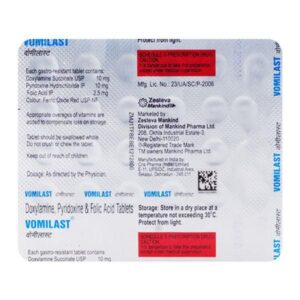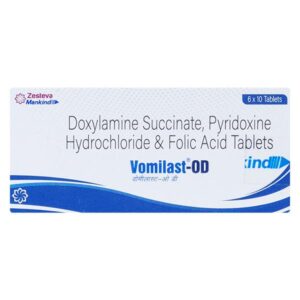FOLIC ACID + PYRIDOXINE (VITAMIN B6) + DOXYLAMINE
Folic Acid: Folic acid is a synthetic form of folate, which is a type of B vitamin. It is commonly used as a dietary supplement to treat or prevent folate deficiency in the body.
Folic acid plays a crucial role in the production of red blood cells and DNA synthesis. It is also involved in various metabolic processes, including cell growth and division. Folate deficiency can lead to anemia, fatigue, weakness, and poor immune function. Folic acid supplements help ensure an adequate supply of folate in the body.
The recommended daily dose of folic acid varies depending on age, gender, and health condition. The average adult usually requires around 400 to 800 micrograms (mcg) of folic acid per day. Pregnant women or those planning to conceive may require higher doses, typically 600 to 800 mcg.
Folic acid is commonly prescribed to pregnant women to prevent neural tube defects in their unborn babies. It also helps support fetal growth and development. Before and during pregnancy, a daily dose of 400 to 800 mcg is usually recommended.
Although folic acid is generally considered safe, it can have some side effects. Common side effects include digestive issues like nausea, bloating, and flatulence. In some cases, high doses of folic acid may mask symptoms of vitamin B12 deficiency. Therefore, it is important to monitor B12 levels regularly when taking folic acid supplements.
In rare cases, allergic reactions may occur, with symptoms such as itching, rash, swelling, dizziness, and breathing difficulties. It is important to seek immediate medical attention if any severe allergic reactions occur.
Folic acid may interact with certain medications, such as anticonvulsants and methotrexate. Always consult with a healthcare professional or pharmacist before starting folic acid supplements, especially if you are taking other medications.
Overall, folic acid is a vital nutrient that plays a crucial role in various bodily functions. It is commonly used to prevent and treat folate deficiency, particularly in pregnant women, and its supplementation has significant benefits for fetal development.
Pyridoxine (vitamin B6): Pyridoxine, also known as vitamin B6, is an essential water-soluble vitamin that plays a crucial role in the metabolism of proteins, carbohydrates, and fats. It is involved in the synthesis of neurotransmitters, including serotonin, norepinephrine, and dopamine, making it important for proper brain function.
The main use of pyridoxine is as a dietary supplement to prevent or treat vitamin B6 deficiency. It is often prescribed for individuals with malabsorption disorders, alcoholism, or certain medical conditions that increase the body’s requirement for vitamin B6.
Pyridoxine exerts its effects by converting into its active form, pyridoxal 5′-phosphate (PLP), which acts as a coenzyme in various enzymatic reactions. PLP is required for amino acid metabolism, heme synthesis, and gene expression.
The recommended daily dose of pyridoxine varies depending on age, gender, and specific health conditions. For adults, the usual oral dose ranges from 1.3-2.0 mg per day, while higher doses may be prescribed by a healthcare professional for certain medical conditions. It is available as an over-the-counter supplement and can also be obtained through food sources such as meat, fish, nuts, and whole grains.
Pyridoxine is generally considered safe when taken within recommended doses. However, high doses of pyridoxine (over 200 mg per day) can lead to neurological symptoms known as sensory neuropathy, which can include numbness, tingling, and pain in the extremities. Prolonged use of high doses can also cause skin lesions and photosensitivity.
In conclusion, pyridoxine (vitamin B6) is an essential vitamin that plays a vital role in metabolism and brain function. It is primarily used to prevent or treat vitamin B6 deficiency and is available as an oral supplement. It should be taken within recommended doses to avoid potential side effects.
Doxylamine: Doxylamine is an antihistamine that is commonly used as a sedative and to relieve symptoms of allergies, such as itching, runny nose, and sneezing. It is also sometimes used as a sleep aid.
The mechanism of action of doxylamine involves blocking the effects of histamine, a chemical in the body that is responsible for causing allergic reactions. By inhibiting histamine, doxylamine reduces symptoms such as itching and nasal congestion.
Doxylamine is typically taken orally as a tablet or capsule. The recommended dose for adults is 25 mg, which can be taken before bedtime to aid with sleep or as needed for allergy symptoms. It should be taken with a full glass of water, and it can be taken with or without food.
Like any medication, doxylamine can cause side effects. Common side effects include drowsiness, dizziness, blurred vision, dry mouth, and constipation. These side effects are usually mild and temporary. However, some individuals may experience more serious side effects such as difficulty urinating, rapid heartbeat, or confusion. If these occur, it is important to seek medical attention immediately.
It is worth noting that doxylamine may cause drowsiness or impair your ability to operate machinery or drive a vehicle, so it is important to use caution when taking this medication and avoid tasks that require alertness until you know how it affects you.
Before taking doxylamine, it is important to consult with a healthcare professional, especially if you have any pre-existing medical conditions or are taking other medications. They can provide personalized advice and guidance regarding the safe and appropriate use of this drug.


